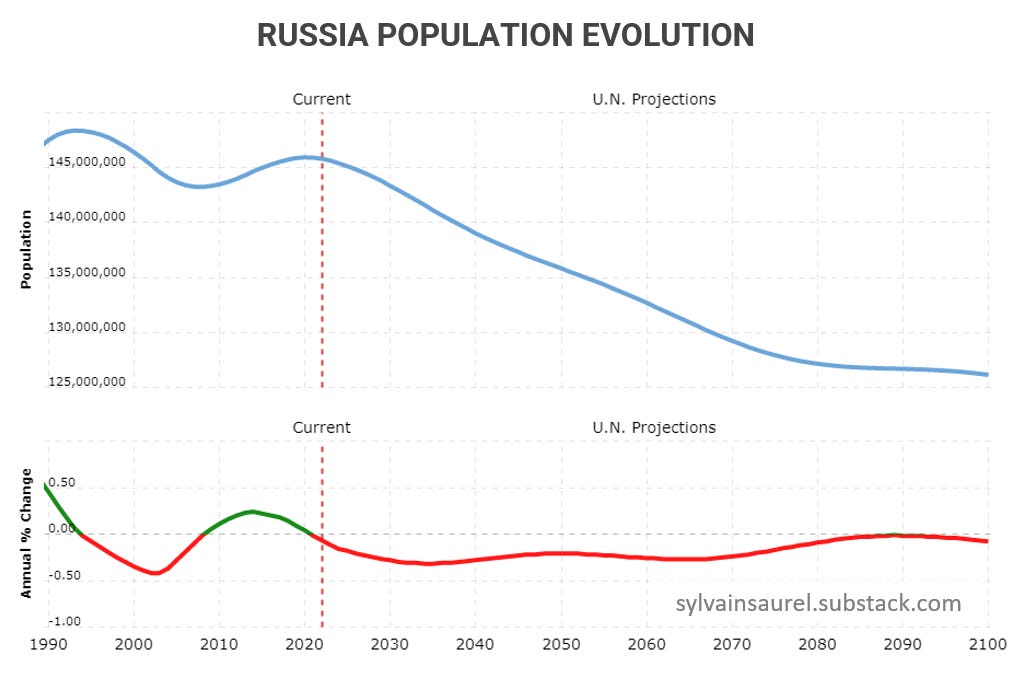Vladimir Putin’s War in Ukraine Is Accelerating Russia’s Demographic Decline.
Putin is jeopardizing the future of his country.
How many middle-class and wealthy Russians have fled their country since the invasion of Ukraine? Because they are revolted by the war started by Vladimir Putin, fear for their safety, or want to ensure a better future for their children, at least 200,000 have already left since the end of February 2022, according to the economist Konstantin Sonin, from the University of Chicago.
In April, another 70,000 to 100,000 people in the new technology sector are expected to leave Russia, according to the industry's trade association. Many have gone to Israel, which makes it easy for both Ukrainians and Russians to settle there, especially if they are high-tech specialists.
Others have gone to Armenia, Kazakhstan, Kyrgyzstan, and, to a lesser extent, Finland and Estonia. This brain drain, preceded by a surge in deaths from the pandemic - more than 700,000 people have died from COVID-19 since the beginning of 2020, according to Reuters - has added to the regime's demographic angst.
The decline of the population is one of Vladimir Putin’s obsessions, since his arrival in power. He sees it as an economic as well as a geopolitical problem. During his speeches, he regularly calls on Russians to have more children. The government has introduced a series of incentives to boost the birth rate, such as bonuses for couples having more than one baby. But these measures have never worked.
As living standards stagnate or even decline since the annexation of Crimea in 2014 and the first round of Western sanctions against Moscow, Russians struggle to project themselves into the future. The number of children per woman, 1.5 on average, is below the threshold of 2.1 required to renew the population, excluding immigration.
It fell sharply in the early 1990s when a severe economic crisis ruined the meager savings accumulated by households during the Soviet era. In 1989, the USSR had 286.7 million inhabitants, more than the United States (246.8 million). After the collapse of the Communist bloc, without the former Soviet republics, the population of the Russian Federation fell to 148.5 million. In 2020, it was 144.1 million, compared to 329.4 million in the United States. And, according to the latest United Nations projections, made before the pandemic and the war, it could fall to 139 million in 2040:
A brain drain detrimental to Russia's future
In other words, the Russian population is melting at a dizzying pace, and the war will only accentuate the trend. This explains why the army is looking for its recruits further and further away, in the peripheral republics. In the long run, the brain drain, especially of young graduates, will weaken the country's ability to innovate, especially since it is occurring on an unprecedented scale, say many observers, claiming that Vladimir Putin is shooting himself in the foot.
Is he? In an article in the New York Times on March 23, 2022, Jennifer Sciubba, a demographer at Rhodes College, calls for caution on this point. Her recent book “8 Billion and Counting: How Sex, Death, and Migration Shape Our World” recalls that many Pentagon experts have long been convinced that, because of the collapse of the birth rate, Russia would struggle to maintain a conventional army worthy of the name.
Or, to put it mildly, that it would soon no longer be a threat. But such reasoning is hardly supported by scientific facts. American experts have rather mistaken their wishes for reality," says Jennifer Sciubba, citing the example of China. If for decades, its strong demographic growth was cited as the regime's weak point by Washington, it is now the aging of its population that is designated as its Achilles heel ... Trying to predict the future by looking at demographics is perilous, especially in military and security matters, she concludes. And this is as true for Moscow as for the Middle Kingdom.
So let us beware of hasty assumptions, even if the phenomenon of demographic decline will accelerate sharply in Russia in the coming years.
Some reading
Michael J. Saylor’s Simple but Compelling Demonstration for Those Who Consider Bitcoin Risky. The biggest risk for the future is with fiat money.
Want To Earn Bitcoin but Have No Initial Investment? Here Is the Solution. A solution that requires work, but nothing is really free in life.
Birth of a Bretton Woods III – The Fall of the American Dollar King, the Emergence of Outside Money. With Bitcoin as the future king?





